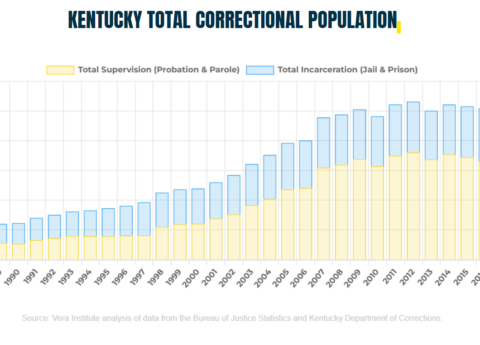Click here to download a pdf of the full report.
Greater Investment in Education and Supports Can Keep Ex-Offenders Out of Prison
Report recommends that Kentucky expand education and supports for inmates and ex-offenders in order to improve reentry
With nearly 31 percent of Kentucky’s former inmates recidivating—returning to prison—within two years, a new policy report from the Kentucky Center for Economic Policy (KCEP) recommends that the state invest more in providing education and supports to inmates and ex-offenders to reduce the likelihood they will return to jail.
“Kentucky passed major legislation in 2011 aimed at reducing rising prison costs in the state budget, but inmate levels continue to be high,” said KCEP Research and Policy Associate Ashley Spalding, the report’s author. “To truly reduce recidivism and cut costs, we must do more to help inmates and former prisoners access the education and supports they need to make their lives better.”
The report, “Improving Reentry in Kentucky through Education and Supports for Inmates and Ex-Offenders,” indicates that about 20 percent of the state’s prison inmates currently participate in educational programs (adult, vocational and postsecondary education) offered through the Kentucky Department of Corrections (DOC), but many more could benefit if resources were available. There are waiting lists for these programs, and access to postsecondary education is especially limited. Educational opportunities in the community after release can also be difficult for inmates and ex-offenders to access.
“Without a decent job, it is difficult for an ex-offender to rebuild his or her life,” said Spalding. “And most who are incarcerated need further education in order to get a job with wages that will support a family when they are released. Unfortunately, many inmates spend years waiting for a slot to open up in one of the DOC’s educational programs.”
The report also emphasizes the importance of supports to reentry. For instance, while incarcerated, inmates who have drug problems need access to treatment. And former inmates who are looking for work and/or furthering their education can benefit greatly from income supports like Temporary Assistance for Needy Families (TANF) and the Supplemental Nutrition Assistance Program (SNAP) while they get their lives back on track. Unfortunately there are few such resources available. There are long waiting lists for drug treatment programs in prison, and most ex-offenders who were convicted of drug felonies do not qualify for TANF and SNAP.
The report calls on the state to:
- Further invest in in-prison DOC education programs to increase access, promote educational attainment and otherwise improve educational opportunities. Additional funding could reduce waiting lists and increase GED, vocational certificate and postsecondary degree attainment among inmates.
- Increase access to educational programs outside of prison by better funding postsecondary and adult education and providing more financial aid options for ex-offenders who often do not qualify for federal or state financial aid.
- Enable ex-drug-offenders to receive TANF and SNAP. Currently those convicted of drug-related felonies in Kentucky do not qualify for these programs unless they successfully complete drug treatment (which can be very difficult to access) or are pregnant. Income supports like TANF and SNAP can help provide support while ex-offenders look for employment and/or further their education.
###
The Kentucky Center for Economic Policy is a non-profit, non-partisan initiative that conducts research, analysis and education on important policy issues facing the Commonwealth. Launched in 2011, the Center is a project of the Mountain Association for Community Economic Development (MACED).

